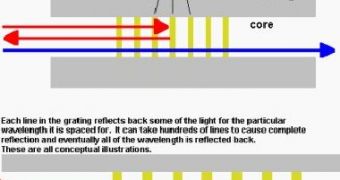Optical computers are the dream of nanotechnology researchers. These computers would use light instead of electricity to manipulate, store and transmit data. Photons have fundamentally different physical properties than electrons and researchers have attempted to make use of these properties to produce computers with performance and/or capabilities greater than those of electronic computers.
A new research conducted at the Ben-Gurion University and Tel Aviv University has created a new technique for producing ultrasensitive optical switches, the means of transporting bits in future all-optical computers.
The new approach uses sound waves to slow light to a nearly complete halt under more common conditions, with ordinary materials at room temperature. Early attempts to slow light waves implied super-cooled devices and materials and much higher costs.
Richard Tasgal is leading the team of researchers who used as a medium a fiber Bragg grating, where the UV-sensitive core of a fiber is exposed through a mask to ultraviolet light. What this does is that it alters the germanium-doped silica fiber core in periodic way along its length so that the index of refraction varies periodically.
When light is sent along this fiber and meets a regularly changing index of refraction, its reflection is multiplied all along the fiber and not only at the ends. This is what scientists call a "distributed mirror."
Consequently, when the light beam is intense and the fiber material produces a nonlinear response to it, the net effect of light wavelets that propagate in the forward and backward direction can be a light pulse traveling at speeds much less than the speed of light in vacuum.
Sound has an important part in the process, as very intense light will cause a slight bunching in the density of the fiber and this can create sound waves. When the scientists made the light pulse travel close to the speed of sound (around 5 km/s) in the material, the reaction intensified.
The potential of sound waves in slowing and processing light pulses in this way is very important and although the technique still needs some refining, future applications in optical computing could definitely benefit from it.

 14 DAY TRIAL //
14 DAY TRIAL //